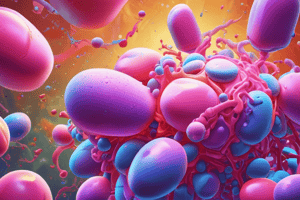Podcast
Questions and Answers
What effect does ionization have on weak bases like morphine in acidic brain cell environments?
What effect does ionization have on weak bases like morphine in acidic brain cell environments?
- Decreased toxicity due to lower concentration
- Increased toxicity due to ion trapping (correct)
- Increased absorption due to higher solubility
- No effect on drug metabolism
Which of the following correctly describes the phases of drug metabolism?
Which of the following correctly describes the phases of drug metabolism?
- Phase I involves the conjugation of drugs for excretion
- Phase II generally involves oxidation and reduction reactions
- Phase II primarily produces hydrophilic metabolites (correct)
- Phase I and II are both necessary for renal excretion
What factor primarily affects drug absorption in the context of pharmacokinetics?
What factor primarily affects drug absorption in the context of pharmacokinetics?
- The chemical structure of the drug only
- The drug's lipid solubility (correct)
- The route of excretion
- The age of the patient
Which of the following components is involved in the metabolism of drugs?
Which of the following components is involved in the metabolism of drugs?
What is the primary role of liver enzymes in drug metabolism?
What is the primary role of liver enzymes in drug metabolism?
What primarily affects glomerular filtration?
What primarily affects glomerular filtration?
Which statement about active secretion in the proximal tubule is true?
Which statement about active secretion in the proximal tubule is true?
Which of the following is a consequence of decreased renal function?
Which of the following is a consequence of decreased renal function?
Which type of drug is primarily eliminated in urine due to its solubility?
Which type of drug is primarily eliminated in urine due to its solubility?
What is true about the clearance of highly cleared drugs?
What is true about the clearance of highly cleared drugs?
What effect does starvation have on drug metabolism?
What effect does starvation have on drug metabolism?
Why is understanding pharmacokinetics important for drug prescribers?
Why is understanding pharmacokinetics important for drug prescribers?
Which of the following factors does NOT typically influence drug excretion?
Which of the following factors does NOT typically influence drug excretion?
What is the main site of drug absorption for most drugs in the gastrointestinal tract?
What is the main site of drug absorption for most drugs in the gastrointestinal tract?
Which of the following factors is least likely to affect the bioavailability of a drug?
Which of the following factors is least likely to affect the bioavailability of a drug?
Which type of drug typically binds mainly to alpha-1 acid glycoprotein?
Which type of drug typically binds mainly to alpha-1 acid glycoprotein?
What is the primary function of first-pass metabolism?
What is the primary function of first-pass metabolism?
Which drug has the highest bioavailability after oral dosing?
Which drug has the highest bioavailability after oral dosing?
What is the primary determinant of drug absorption in the gastrointestinal tract?
What is the primary determinant of drug absorption in the gastrointestinal tract?
What does the term 'bioavailability' refer to?
What does the term 'bioavailability' refer to?
Which barrier is considered a crucial aspect of drug distribution in the body?
Which barrier is considered a crucial aspect of drug distribution in the body?
What is the primary function of the cytochrome P450 family of enzymes in drug metabolism?
What is the primary function of the cytochrome P450 family of enzymes in drug metabolism?
Which enzyme is associated with the metabolism of Ramipril into its active form?
Which enzyme is associated with the metabolism of Ramipril into its active form?
What is the outcome when midazolam is administered with rifampicin?
What is the outcome when midazolam is administered with rifampicin?
Which of the following substances is a substrate of the CYP2D6 enzyme?
Which of the following substances is a substrate of the CYP2D6 enzyme?
What percentage of Caucasians are classified as 'poor metabolizers' due to a lack of CYP2D6?
What percentage of Caucasians are classified as 'poor metabolizers' due to a lack of CYP2D6?
Which of the following represents a potential drug interaction with CYP3A4?
Which of the following represents a potential drug interaction with CYP3A4?
What type of metabolites are formed as a result of N-dealkylation processes?
What type of metabolites are formed as a result of N-dealkylation processes?
Which conjugates are mentioned as being excreted in urine after metabolism?
Which conjugates are mentioned as being excreted in urine after metabolism?
Study Notes
Glomerular Filtration
- Molecular size restricts glomerular filtration
- Lipid solubility does not affect glomerular filtration
- Highly protein-bound drugs are negligibly filtered
- Only unbound drugs are filtered
- Reduced glomerular filtration occurs with age and kidney disease, diminishing drug excretion
Active Secretion
- Proximal tubule actively secretes free and bound drugs
- Two active secretion pumps exist
- Highly cleared drugs have a clearance rate equivalent to renal blood flow
- These pumps are responsible for secreting:
- Bases, e.g., Pancuronium
- Acids, e.g., Penicillin, Thiazide diuretics
Drug Excretion Based on Lipid Solubility
- Water-soluble drugs are excreted in urine
- Lipid-soluble drugs re-enter the bloodstream
Factors Influencing Drug Metabolism and Therapeutic Window
- Pharmacokinetic factors: Starvation, Fever, Alcohol intake, Cigarette Smoking, Cardiovascular function, Liver function, Renal function, Gastrointestinal function
- Genetic Factors: Influence drug metabolism and response
- Other factors: Age, Sex, Dietary Factors, Herbals, Drugs
Pharmacokinetics (ADME) - Overview
- ADME stands for Absorption, Distribution, Metabolism, Excretion
- Understanding pharmacokinetics is crucial for drug prescribers
Drug Absorption
- Routes of administration:
- Oral: Tablets, capsules (most common)
- Rectal: Suppositories (Diazepam), rectal foams (steroids)
- Sublingual: Tablets, sprays (Glyceryl Trinitrate)
- Gastric emptying: Determines drug absorption; faster emptying leads to quicker absorption
- Intestinal surface area: Small intestine is the primary site of absorption due to its larger surface area
- First-pass metabolism: Drugs metabolized in the liver before reaching systemic circulation
- Bioavailability: Fraction of a drug dose reaching systemic circulation following oral administration. Factors influencing bioavailability include:
- Drug absorption
- First-pass metabolism
Drug Distribution
- Protein binding: Drugs bind to proteins like albumin and α1-acid glycoprotein in the bloodstream, influencing their distribution
- Blood flow: Blood flow to different tissues influences drug distribution
- Body compartments: Drugs can accumulate in specific compartments, including:
- Blood-brain barrier
- Placental barrier
- Cell membrane: The cell membrane controls drug movement between the extracellular and intracellular fluids
Drug Metabolism
- Lipid solubility: Lipid-soluble drugs are more readily metabolized
- Phase I metabolism: Primarily involves oxidation, reduction, or hydrolysis, changing the drug's structure and making it more water-soluble
- Phase II metabolism: Conjugation reactions, adding a polar group to the drug molecule to improve its water solubility and excretion
- Liver enzymes: Primarily Cytochrome P450 enzymes, involved in drug metabolism and can be inhibited or induced by various substances, resulting in drug interactions
- Genetic polymorphism: Individual variations in genes encoding drug-metabolizing enzymes, leading to differences in drug metabolism and response
- Prodrugs: Inactive forms of drugs that become active after metabolism
Drug Excretion
- The primary route of drug excretion is through urine
- Metabolism increases drug water solubility, facilitating renal excretion
- Renal excretion is influenced by glomerular filtration and active secretion in the proximal tubule
- Factors like age, renal function, and drug characteristics can affect excretion rates
Drug Interactions
- Inhibitors block the activity of drug-metabolizing enzymes, increasing a drug's concentration and potential for adverse effects (e.g., Erythromycin, Ketoconazole).
- Substrates are drugs that are metabolized by a specific enzyme (e.g., Midazolam, Cyclosporin).
- Inducers enhance the activity of drug-metabolizing enzymes, decreasing a drug's concentration and effectiveness (e.g., Rifampicin, Carbamazepine)
Genetic Polymorphism In Drug Metabolism
- Poor metabolizers lack certain drug-metabolizing enzymes (e.g., CYP2D6), leading to higher drug concentrations and potential toxicity
- Extensive metabolizers possess normal levels of these enzymes.
- This impacts various drugs including cardiovascular, psychiatric, and analgesic medications
Prodrugs
- Prodrugs are inactive drug forms converted to their active forms by metabolism.
- Ramipril is an example, metabolized to Ramiprilat, an active antihypertensive drug. This conversion is mediated by the enzyme, Carboxyesterase 1, in human liver.
Studying That Suits You
Use AI to generate personalized quizzes and flashcards to suit your learning preferences.
Related Documents
Description
This quiz explores key concepts in pharmacokinetics, focusing on glomerular filtration, active secretion, and factors influencing drug metabolism. Understand how molecular size, lipid solubility, and various physiological factors affect drug clearance and therapeutic outcomes.




